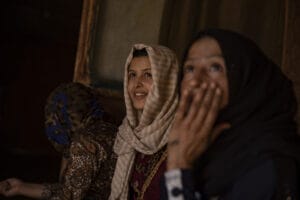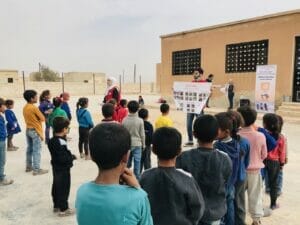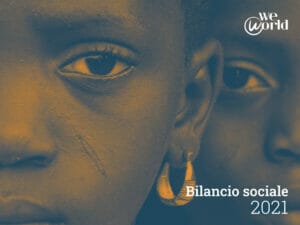
Eleven years after the beginning of the crisis, there are still large numbers of girls and boys in Syria who do not have access to quality education services in safe and secure environments. In recent years, the conflict has overlapped with the pandemic and a worsening of the economic crisis. According to the Education Sector and UNICEF, more than 2 million children are currently out of school, and more than 1.5 million are at risk of dropout. The main barriers preventing access to education are related to economic factors, exacerbated by the difficulties created by the pandemic, as well as the lack of adequate and accessible educational services. The obstacles are even more significant for children with disabilities, since almost all schools are not accessible, teachers do not have the resources to provide them with individual support, and a strong stigma at social level often makes their inclusion in school activities difficult.
WeWorld-GVC in Syria
WeWorld-GVC has been working in Syria since 2011, with a focus on projects related to education and WASH (water, sanitation and hygiene). The areas of intervention include the governorates of Aleppo and Deir-Ez-Zor, both of which have been severely affected by the conflict and are still occasionally the scene of clashes. In recent years, the focus of our intervention has shifted from urban to rural areas, which have been hit even harder by the crisis and where very few services are available to the population. Our Education in Emergencies program is based on an approach that supports not only girls and boys, but also families, schools, and the communities as a whole.
WeWorld-GVC's intervention in the Ashara province
Ashara is located in the heart of Syria, along the banks of the Euphrates River, in the governorate of Deir-Ez-Zor and about 70km away from the homonymous city. It is a rural area where most of the population works in agricultural activities. Under siege for years during the conflict, a large number of residents was forced to leave everything behind and seek shelter elsewhere. However, in the last 3 years the situation has stabilized, and the area has seen a strong flow of returns of families wanting to rebuild their daily lives in their lands and in their homes.
As part of the project funded by the Italian Cooperation, WeWorld-GVC intervened in 4 schools in this area. The buildings, previously damaged and therefore dangerous for students and teachers, have been rehabilitated and secured, ensuring that classrooms and toilets are accessible to people with disabilities along with providing sufficient privacy and protection for girls. As many families find it difficult to obtain the materials needed for their children to study, WeWorld-GVC distributed school supplies kits, which were made available to teachers and students in each school. In addition, "Resource Rooms," meaning rooms equipped with teaching materials specifically for the needs of girls and boys with disabilities, were set up in 3 schools, which will create a safe space for teachers to organize individual lessons and provide them with structured support.
"Some children have to walk more than half an hour every day to get to school, and classes are always too crowded. It is very important to reduce the number of students in each class to give everyone a chance to participate actively. With WeWorld-GVC's intervention, concrete support has been given to these communities."
(F.A.S., Teacher, Ashara Province)
Thanks to the intervention of WeWorld-GVC and the Italian Cooperation, more than 2,500 girls and boys in the Ashara area found safe, accessible and secure educational environments upon their return to class in September. Furthermore, they have the materials they need to continue their studies. Like Ashara, there are many villages in Syria where educational services have been severely affected by the crisis, which is why a rapid and multi-sectoral intervention is now needed more than ever.



